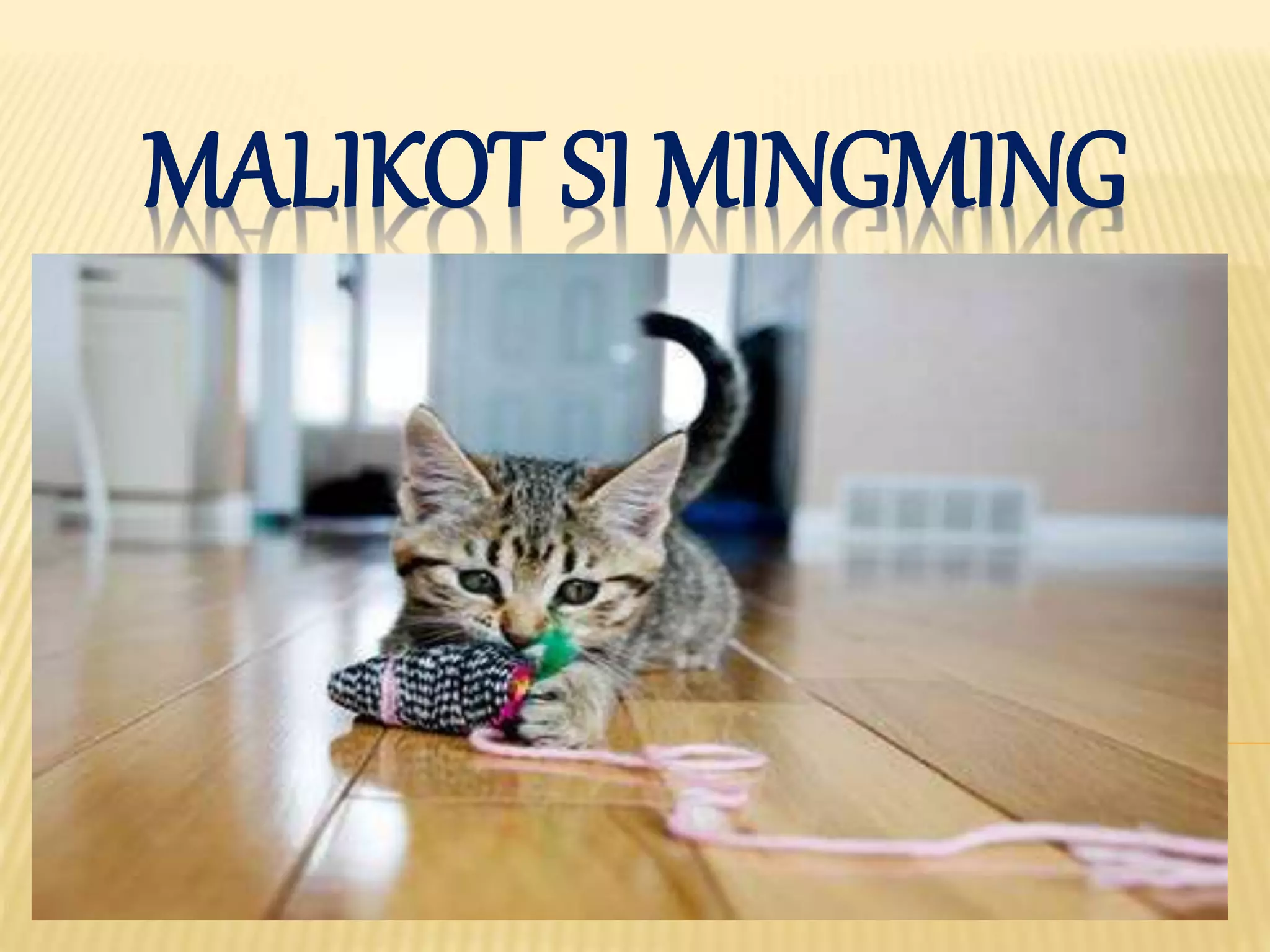Have you ever met someone who just can't sit still, someone who always seems to be moving, perhaps a little bit restless? That kind of energy, that constant motion, has a wonderful word in Tagalog: "malikot." It's a term that captures a particular kind of spiritedness, and getting to know its full meaning in English opens up a bit of the heart of Filipino daily life, you know? It's really more than just a simple translation; it carries a feeling, a way of seeing the world.
So, what exactly does "malikot" bring to mind when we try to put it into English? Well, it isn't just one single word, but a collection of ideas. It speaks to a person, or sometimes even an animal, that just doesn't stay put, that has a lively, sometimes a bit mischievous, spirit. It's a word often heard in homes where there are young ones, as many parents, as a matter of fact, come across this stage where their kids are just full of boundless energy.
This word, "malikot," truly paints a picture of someone who finds it hard to behave in a quiet manner or remain in one spot. It’s a term that helps describe that active nature, that urge to move, to explore, or to play. Knowing this term, and how it’s used, can really help you connect better with Filipino conversations and understand the little nuances of their language, which is pretty cool.
Table of Contents
- What is "Malikot" in English? Unpacking the Core Meaning
- Different Shades of "Malikot" in Everyday Talk
- How to Spot a "Malikot" Moment
- Learning "Malikot" and Other Filipino Words
- Frequently Asked Questions About "Malikot"
What is "Malikot" in English? Unpacking the Core Meaning
When you try to get to the heart of "malikot" in English, you find it's a word that describes someone who just can't seem to settle down. It’s about a person who has trouble staying in one place or keeping still, more or less. This isn't always a bad thing; sometimes it's just a natural part of a lively character. The word truly captures that sense of constant motion, that feeling of not being able to be quiet for long. It’s a pretty common word, especially when people are talking about someone who is very active.
According to what I've seen, "malikot" is a Tagalog term used to describe a person who cannot afford to behave or stay in one place. This means they are often moving, shifting, or looking for something to do. It’s not necessarily about being disruptive, but rather about having an abundance of energy that needs an outlet. You know, like when a little kid just has to run around and explore everything.
More Than Just "Restless": A Deeper Look
While "restless" is a good starting point for translating "malikot," it doesn't quite get the whole picture. "Malikot" also carries other meanings, like being fidgety, mischievous, roaming, or even a little bit naughty. It’s a word that can describe a range of behaviors, from simply having too much energy to playfully causing a little bit of trouble. So, it's not just about a lack of calm, but also about the kind of actions that spring from that active nature. This broadness makes it a really interesting word to explore, you see.
For example, someone might be described as "malikot" if they're constantly tapping their foot, or if they're always getting up and walking around when they should be sitting still. It could also mean they're the kind of person who enjoys playful pranks or exploring new areas. The context of the conversation usually helps you figure out which specific shade of "malikot" is being used, which is rather helpful.
"Malikot" and Children: A Common Connection
It's very common to hear "malikot" used when talking about children. Most kids, as a matter of fact, go through a stage where their parents find them to be quite "malikot." This is just a natural part of growing up, when little ones are full of energy and curiosity, and they want to touch everything, explore everything, and move all the time. It’s a normal developmental phase, and the word captures that perfectly.
When a parent says their child is "malikot," they're often describing a child who is very active, perhaps squirming in their seat, or always wanting to run and play. It’s usually said with a mix of affection and perhaps a little bit of exasperation, because keeping up with a "malikot" child can be quite a task. It's truly a relatable experience for many families around the world, you know.
Different Shades of "Malikot" in Everyday Talk
"Malikot" is a versatile word, and its meaning can shift slightly depending on the situation. It’s a bit like how we use words like "active" or "lively" in English; they can mean different things based on who or what you're talking about. Understanding these different shades helps you grasp the full richness of the term, so it's almost like learning several words at once.
The Fidgety Side
One common meaning of "malikot" is "fidgety." This describes someone who makes small, restless movements, perhaps tapping their fingers, shaking their leg, or shifting in their seat. It’s not necessarily about moving from one place to another, but about an inability to stay completely still. This could be due to nervousness, boredom, or just a lot of stored-up energy. For instance, a student might be "malikot" during a long lecture, constantly adjusting themselves or playing with a pen, which is something many people can relate to.
When someone is "malikot" in this way, they might not even realize they're doing it. It's often an unconscious expression of their inner state. This type of "malikot" is usually harmless, just a way for someone to release a little bit of their extra energy. You might see this in a long line, or perhaps when waiting for something important to happen, which is very common.
The Mischievous Spark
"Malikot" can also mean "mischievous." This refers to someone who is playfully naughty, someone who enjoys lighthearted pranks or minor acts of trickery. It’s not about doing anything truly harmful, but rather about having a playful spirit that sometimes leads to a little bit of trouble. This kind of "malikot" often brings a smile to people's faces, even if it causes a slight inconvenience. For example, a child who hides their sibling's toy just to see their reaction might be called "malikot" in a mischievous way, which is kind of cute.
This meaning of "malikot" often applies to children, but it can also describe adults who have a playful, teasing nature. It’s about a lively spirit that finds joy in lighthearted fun, sometimes at the expense of others, but always in a good-natured way. It’s that little spark of playful rebellion, you know, that adds some fun to things.
The Roaming Spirit
Another aspect of "malikot" is "roaming." This describes someone who tends to wander, to move from place to place without a specific destination in mind. It’s about a desire to explore, to see what’s around the next corner, or simply to be in motion. This can apply to a child who keeps running off in a park, or even an animal that can't be contained. So, if someone is always moving around the house, checking different rooms, they might be considered "malikot" in this sense, which is pretty easy to understand.
This meaning highlights the physical movement aspect of "malikot." It’s about not being tied down to one spot, about having a natural inclination to explore one's surroundings. It’s a very active form of the word, focusing on the act of moving about freely. You might hear this term if someone is looking for a lost item and is moving all over the place, which happens a lot.
The Naughty Hint
Finally, "malikot" can sometimes carry a hint of "naughty." This is usually in a mild, playful sense, similar to mischievous, but perhaps with a slightly more direct implication of breaking a small rule or doing something they shouldn't. It’s not about serious wrongdoing, but about a minor transgression, often driven by curiosity or an excess of energy. For instance, a child who keeps touching something they were told not to touch might be described as "malikot" in a naughty way. This usage is still often affectionate, just with a gentle warning attached, so it's not really a harsh judgment.
This particular shade of "malikot" often comes with a smile and a shake of the head from the person saying it. It acknowledges that the behavior isn't ideal, but it also recognizes that it comes from a place of youthful energy or a lively personality. It’s a way of describing a small misbehavior without making it sound too serious, you know.
How to Spot a "Malikot" Moment
To truly grasp "malikot," it helps to see it in action or hear it in context. Filipino speakers use this word naturally in many situations, and observing these moments can make its meaning much clearer. It’s about paying attention to both the words being said and the actions being performed, which is really key.
In Conversation: Understanding the Context
When you hear someone say "malikot," pay attention to who they are talking about and what they are doing. If they are talking about a child who is running around and touching everything, then "malikot" means active and perhaps a bit mischievous. If they are talking about an adult who is constantly tapping their foot during a meeting, then it leans more towards fidgety. The situation provides the biggest clue, you see.
For instance, if a parent tells their child, "Huwag kang malikot!" (Don't be malikot!), they are telling the child to stop moving around, to sit still, or to behave themselves. This shows the word's use as a gentle command to settle down. Understanding these everyday phrases helps you truly understand the word's practical use, and it's pretty common to hear.
Observing Actions and Behaviors
Beyond words, you can often recognize "malikot" behavior by simply watching. A "malikot" person might be someone who:
- Constantly shifts their body while sitting.
- Taps their fingers or bounces their leg.
- Gets up frequently to walk around, even if there's no clear reason.
- Touches objects out of curiosity, even if they're not supposed to.
- Engages in playful teasing or minor pranks.
So, the next time you are around people speaking Tagalog, and you see someone who fits this description, you will likely hear the word "malikot" being used. It’s a very descriptive word that captures a common human trait, especially in younger individuals. You know, it's just a part of life.
Learning "Malikot" and Other Filipino Words
If you want to learn "malikot" in English, you will find the translation here, along with other translations from Filipino to English. You can also listen to audio pronunciation to learn how to say it correctly, which is really helpful. Learning words like "malikot" gives you a better sense of the Filipino language and its culture. It’s not just about memorizing definitions, but about grasping the feelings and situations these words describe, you know?
To truly get a feel for the word, it's good to look through examples of "malikot" translation in sentences, listen to pronunciation, and learn grammar related to its use. This comprehensive approach helps you not just understand the word, but also use it appropriately in conversations. It's a bit like learning a new color; you don't just know its name, you learn to see it in different light, which is pretty cool. For more insights into Filipino language and culture, you might find this resource helpful: TagalogLang.com.
Learning words that describe human behavior, like "malikot," helps us connect with others on a deeper level. It shows us how different cultures view and express similar human experiences. It's a small word, but it carries a lot of meaning, especially when you think about how often it's used to describe active children. You can learn more about language nuances on our site, and link to this page here.
Frequently Asked Questions About "Malikot"
Is "Malikot" always a negative word?
No, "malikot" is not always a negative word. While it can describe behavior that might be a bit challenging, especially in children, it often carries an affectionate or understanding tone. It usually refers to a natural energy or a playful spirit rather than something truly bad. It’s often used with a smile, you know, acknowledging a child's lively nature.
Can "Malikot" describe things other than people?
Yes, "malikot" can sometimes describe things other than people, though it's most commonly used for individuals, especially children. For example, you might hear it used to describe a pet that can't stay still, like a very active puppy. It implies a restless or constantly moving quality, which can apply to animals or even, in some very specific contexts, to objects that are unstable or wobbly, but that's less common, you see.
How do I pronounce "Malikot"?
The pronunciation of "malikot" is roughly "mah-LEE-kot." The stress is on the second syllable, "LEE." Listening to native speakers or using an audio pronunciation tool can really help you get it just right. Many online dictionaries offer audio for Tagalog words, which is pretty convenient for learning.



Detail Author:
- Name : Hertha Barton
- Username : zmuller
- Email : mae98@hotmail.com
- Birthdate : 1987-07-05
- Address : 62691 Retha Fort Marcosstad, ME 41795
- Phone : 407.644.2897
- Company : Kuhlman PLC
- Job : Interpreter OR Translator
- Bio : Rerum harum cum consectetur facere magnam a. Veniam minima sed molestiae aut et voluptatem. Nihil totam quaerat nihil ab quasi rerum sit et. Quidem omnis eum officia in aut aliquid.
Socials
linkedin:
- url : https://linkedin.com/in/lacy_official
- username : lacy_official
- bio : Id quam eligendi quasi possimus.
- followers : 2570
- following : 2116
facebook:
- url : https://facebook.com/lacy_corkery
- username : lacy_corkery
- bio : Vel blanditiis nihil magnam aut. Omnis incidunt praesentium fugit corrupti.
- followers : 2682
- following : 1847
instagram:
- url : https://instagram.com/lacy_dev
- username : lacy_dev
- bio : Maiores repellat ipsa impedit ipsum placeat. Quia esse labore quo reprehenderit.
- followers : 3748
- following : 2310

